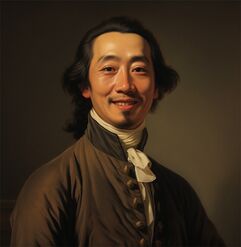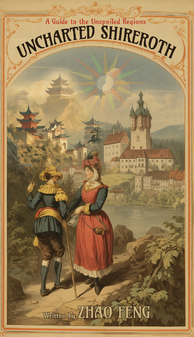Zhao Feng

Zhao Feng (1690 AN - ...) was a prominent figure in the Imperial Republic of Shireroth, known for his devotion to Cedrism, his literary achievements, and his long-standing political career. Initially regarded as a progressive force within the traditionalist camp, his views and politics became increasingly out of step with the evolving, more radicalized political landscape as unrest and war spread through the empire in the late 1730s AN.
Early Life and Family
Zhao Feng was born in Daocheng in 1690 AN, during the turbulent years preceding the integration of Jingdao into the Imperial Republic of Shireroth. His parents came from diverse backgrounds: his father was a Jingdaoese officer serving in the prestigious Imperial Whites, while his mother was a Shirerithian diplomat involved in a covert mission to improve relations between the two countries during the reign of the Chidao Emperor. Despite the political tensions between Shireroth and Jingdao at the time, the two met during one of these diplomatic exchanges, and they fell in love.
Their marriage, which occurred shortly after Zhao’s mother became pregnant, was a controversial union. In Jingdao, such unions with foreigners (particularly Shirerithians) were frowned upon. Zhao’s father faced ostracism from his fellow officers, and only after personally appealing to the Heavenly Light during a military inspection was their relationship begrudgingly accepted by his peers. This early exposure to the difficulties of cross-cultural relations would have a significant impact on Zhao’s later worldview and writing.
Education and cultural influence
Growing up in the Jingdaoese capital, Zhao Feng was raised in a household that embraced both his Jingdaoese and Shirerithian heritages. His early education focused on classical Jingdaoese texts, Apollontean philosophy, and Shirerithian political history. This blending of cultures shaped Zhao into a unique intellectual figure, and he often commented that he felt equally at home with both the strict formality of Jingdaoese tradition and the free-thinking, Cedristic tendencies of Shireroth (and Batavia).
In 1718 AN, the Jingdaoese Heavenly Cult of Tianchaodao adopted elements of Cedrism, merging the two traditions in a way that resonated deeply with Zhao’s personal identity. His acceptance of Cedrism that same year was a symbolic unification of his dual heritage, and it played a crucial role in shaping his personal and political beliefs moving forward.
Political career and service as Minister of Military Affairs
Zhao Feng’s political career began somewhat unexpectedly in 1717 AN, when he was appointed Minister of Military Affairs in the First Thuylemans Government following the general elections. Despite his limited formal experience in military strategy, Zhao’s deep commitment to the Mango Throne and his connections within both the Heavenly Court and Shirerithian aristocracy helped secure his position. His tenure as Minister of Military Affairs lasted until 1723 AN, when he was reappointed in the Second Thuylemans Government.
During his time as Minister, Zhao advocated for military reform and modernization, policies that were initially seen as progressive and necessary for the defense of Shireroth. He worked to streamline military logistics, expand conscription efforts, limit dependence on foreign production and increase of the mobility of the armed forces. These reforms, however, were often more the work of his deputies and assistants, as Zhao struggled to balance his dual identity as a politician and intellectual.
Literary Contributions

Outside of his political life, Zhao Feng earned significant renown as a literary figure, with his most famous work being the travel guide series titled Uncharted Shireroth. This collection chronicled Zhao’s journeys across the diverse landscapes of Shireroth, offering readers a glimpse into the empire’s many cultures and regions. Written in an engaging, accessible style, Uncharted Shireroth appealed to a wide audience, and it became a popular read among both academics and laypeople alike.
In addition to his travelogues, Zhao authored several important historical texts, including a comprehensive history of the Great Jing Dynasty and a biography of Kaiser Ayreon IV, whose reign he greatly admired for its promotion of unity across Shireroth’s often-fractured political landscape.
His literary output, much like his political work, was deeply informed by his Cedrist beliefs and his dedication to traditional values. While many praised his writings for their balance and depth, as the political environment shifted, his later works were increasingly criticized for their nostalgic tone and perceived resistance to modernization. By the 1730s AN, Zhao’s ideas, once viewed as essential for the empire’s stability, began to appear outdated. As the Streïur uis Faïren intensified and discontent grew, Zhao’s focus on traditionalism and central authority became increasingly unpopular among both the army and the populace.
Election to the Zhongji Provincial Assembly (1734 AN)
In the 1734 AN elections, Zhao Feng was elected to represent his Nangang electorate in the southern part of Zhongji Province during a crucial moment in Jingdaoese and Shirerithian politics. The elections, held in the midst of socio-political unrest and the continued Streïur uis Faïren, were expected to address rising public dissatisfaction with the government’s handling of both domestic and foreign affairs.
However, Zhao, preoccupied with his role as Minister of Military Affairs and the government's retreat from Shirekeep to Novi Nigrad, was unable to take up his seat personally. Instead, his eldest son, Riku Feng, was appointed to fill the role in his name. The Feng family, like many families of the time, opposed any significant changes to the government. They expressed unwavering support for both the Kaiseress’s government and the Heavenly Light, arguing that the preservation of traditional authority was essential to maintaining order in the empire.
Zhao’s decision to take the provincial assembly seat was not driven by a desire for change but rather out of a sense of duty to defend the Mango Throne and the Heavenly Court. He viewed the political unrest as a dangerous distraction that could weaken the empire’s ability to fight its external enemies, namely, the Benacian Union. He feared that internal instability would undo the fragile successes achieved on the frontlines and potentially expose Shireroth to greater danger.
The Waning Influence of Zhao Feng and His Reputation
By the late 1730s AN, Zhao Feng’s once-progressive conservative views had become increasingly seen as too moderate. As the social unrest continued to escalate, with calls for reforms and even revolution growing louder, Zhao remained a staunch defender of the old order, even if he himself had hoped for social changes through time. He publicly condemned those who sought to undermine the authority of the Heavenly Light or question the legitimacy of the Kaiseress’s government.
Zhao’s rigid stance against meaningful reform alienated many of his earlier supporters, who had initially seen him as a pragmatic, forward-thinking leader and were increasingly pressured into radicalising their own views under pressure of the street. As the war dragged on and economic hardships worsened, more and more people began to view him as out of touch with the needs of the people. His insistence on prioritizing military efforts over social change, while once a widely accepted viewpoint, now appeared tone-deaf in the face of widespread hunger, poverty, and disillusionment. Even in the East, which was untouched by the war.
Although Zhao Feng never wavered in his loyalty to the empire or his belief in a strong centralized government, his refusal to adapt to the changing political realities around him cemented his legacy (ironically) as a symbol of the old guard. While his literary works and contributions to military reform remain respected, his political career increasingly became a cautionary tale of a man who, once seen as a bridge between two worlds, ultimately found himself on the wrong side of history...
[To be continued.]
*Chop chop. Someone's head is going to roll.*
Personal Life and Legacy
Zhao Feng was granted the title Lord of Nangang by Kaiseress Salome, a title reflecting his status as a member of the lower nobility. Despite his declining political influence, Zhao’s family maintained their positions of prestige, with his son Riku taking on an increasingly prominent role in provincial politics. Zhao Feng’s legacy is a complex one. His literary contributions—especially his travel writings and historical texts—continue to be celebrated. However, his political career, once seen as embodying the progressive conservative ideals of his time, became a point of controversy as Shireroth moved toward a period of radical change.
Zhao Feng is remembered as a man of deep convictions, whose dedication to his country and his beliefs remained unshaken even as the world around him changed beyond recognition.
Zhao Feng was married with Sora Liu, daughter of a wealthy merchant. They were blessed with five children:
- Riku Feng, son.
- Jin Feng, son.
- Mei Feng, daughter.
- Akira Feng, daughter.
- Sisera Feng, daughter.